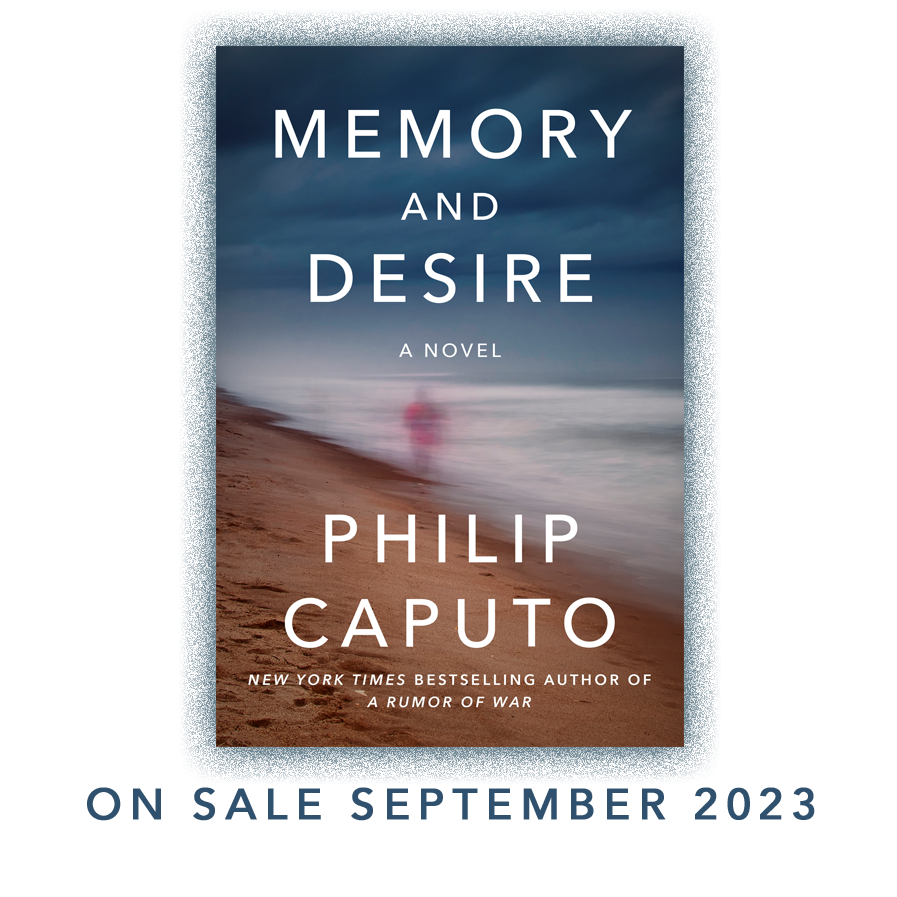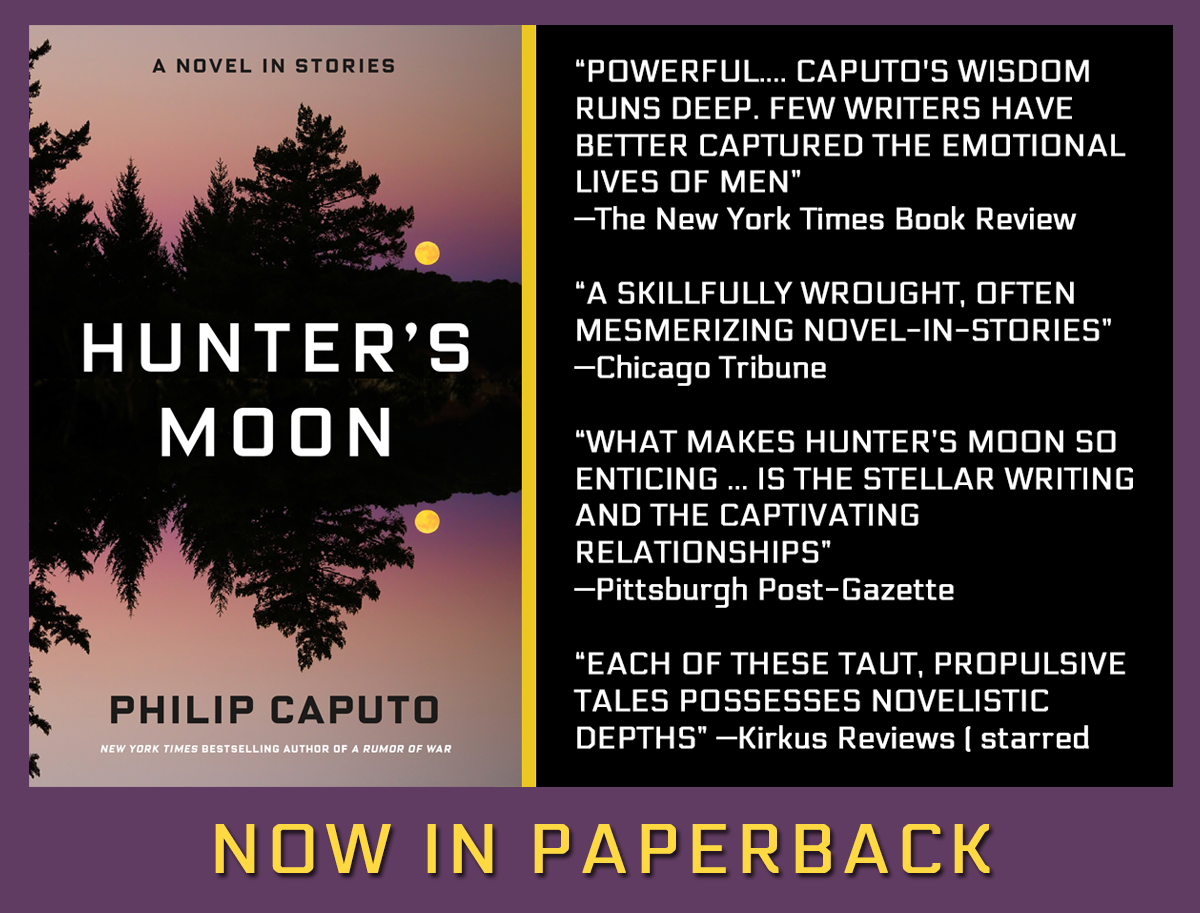It’s always gratifying for an author on a speaking tour to fill a ballroom. More than 300 people attended the Friends of Saddlebrooke Libraries luncheon in Tuscon, Arizona, where I spoke about The Longest Road and read excerpts from the book on Friday, Nov. 22d. Afterward, I signed about 100 copies of TLR, along with my novels, Acts of Faith and Crossers, and my Vietnam memoir, A Rumor of War. All very soothing to the writerly ego — one writes to be read, after all — but what was most gratifying was to see so many people turn out in support of libraries and the written word. Maybe the printed book and those who create them are not yet extinct species. I was introduced by Karen Shickendanz (maiden name Karen Daigle), who was a cub reporter with me on the Chicago Tribune in 1968. I credit Karen with launching my career. On my first day on the job, I was assigned to write an obituary, and froze at my typewriter (you of a certain age may remember that instrument) because, having had no formal journalism training, I had no idea how to write one. Karen, a graduate of the University of Missouri journalism school, walked me through it. I’ll always feel indebted to her. I might have been fired before I even got started.
This event took place on the 50th anniversary of the Kennedy assassination, almost exactly to the hour when Lee Harvey Oswald fired his mail-order rifle in Dallas, changing the course of history. That moment was in the back of my mind as I spoke and signed and answered questions from the audience. Like most Americans my age, I’d been swept up by the glamor of the Kennedy era — the so-called Camelot — and Kennedy’s challenge to ask not what your country can do for you, but what you can do for your country, was among the reasons I joined the U.S. Marine Corps. Unlike most Americans my age, I cannot remember what I was doing or where I was when I heard of his assassination. I know that I was living in a student apartment on Farwell Avenue on Chicago at the time, and that I was attending Loyola University, but that’s all I can say. I may have been in class, walking across campus, or in my apartment. This lapse of memory embarrasses me, it seems almost shameful when the subject comes up in conversation and I hear someone recall in the minutest detail the moment when he or she heard the news.



You’ve made comments about your father; you spoke of taking The Longest Road while you were still able and now this thing about memory….I wish you’d write a book about getting old.
I can’t thik of anything positive to say about it, excpt that it bets the only alternative.
Perhaps the pleasure in the inexorable truth of getting old is to bear witness.
The problem is that few, if any, are willing to listen to your testimony.
And therein lies the ironic tone of your book about aging–a comedy, a satire, a sophisticated yet self-deprecating wit that enables the savaging of damnable age; the marginalizing of gray beards and virtually any other complaint about forthcoming dotage; all presented with Mandela-ic visage, devoid of rancor, bitterness or resentment.
This is the bow tie on your career; humor as a tool to convey the damnation of octogenairanism. If you write it (properly); they will read. Eighty plus publishers thought Rumor was unfit for public consumption; they were wrong. A novel in which disciplined and unrelenting humor is the vehicle….
Perhaps the lack of specific memory is nothing more than age. I was 10 years old and in the 5th grade at St. Paul Catholic School when the announcement was made. I remember exquisite detail of the moment, including how I got permission to go to the restroom and upon looking out the window, not understanding why the flag was not (yet) at half-staff. But the rest of the day is gone until I got home that night and my mother and I locked eyes; she’d been crying but we didn’t say anything, at least that I remember. From then it was watching TV until Monday night; the most vivid memory there is the sound of the drums in the funeral procession. That is the sum total of all memories remaining and I’m guessing even those will fade as I get older. Embarrassed? Not really. Sad? Most definitely.
Interesting how our first mentors in journalism stand out. Mine was a guy named Bernie Hunt, a banty rooster of a Canadian who was my editor at the Key West Citizen. What he did for me that was so formative was (his words)turning me loose everyday–‘Go find me a story’ and then validating me as I did, day in and day out (tough edits and not). And, of course, there was the guy who sat next to me in the newsroom, a cauldron of passion for news that I was both drawn to and feared, someone who’d arrived at the Citizen about 6 months prior. His name was Marc…..
Hello Phil,
I felt compelled to write after I read your comments today.
I followed you as Sales Promotion Supervisor at 3M National and read your many Ad Man publications
learning from your issues how to write mine. It was always a great time of the day to have coffee with you
and Ken Granik in the cafeteria. I recall your yearning about getting your story out relative to your time in Viet Nam. I worked for George Von Druska and Mark Driza for about 3 years then changed to a medical sales career.
Now, I am retired and living near San Francisco. I look forward to any time that you venture out my way.
it would be great to see you again. I am now in the early pages of your novel, Equation for Evil, and I can hear your voice as I read. Thank you for following your dream, you are a wonderful writer.
Sincerely,
Ron Knibbs
Thank you for your kind comments.